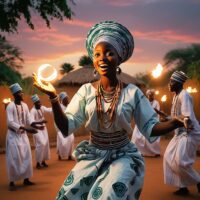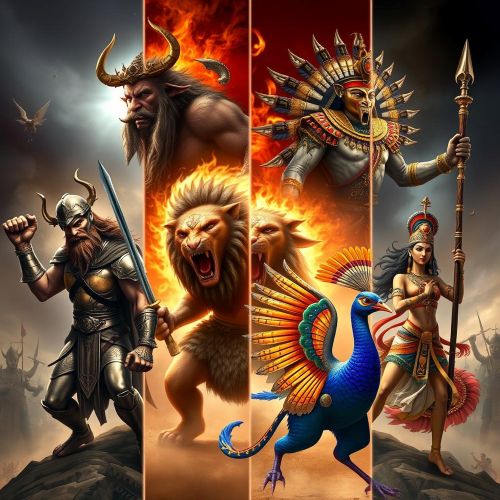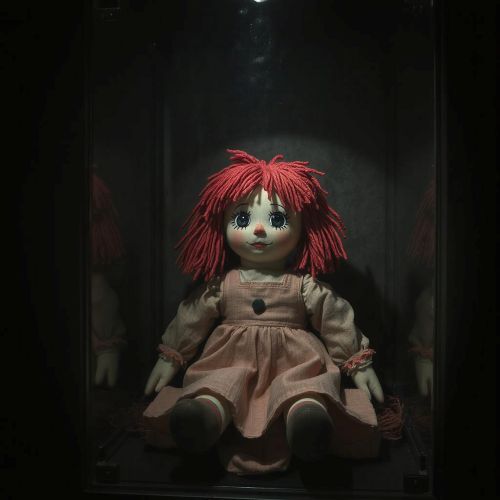Bori : The Ancestral Spirits
Listen
At a glance
| Description | |
|---|---|
| Origin | Hausa Mythology |
| Classification | Spirits |
| Family Members | N/A |
| Region | Nigeria |
| Associated With | Healing, Protection, Divinity |
Bori
Introduction
Bori is a central element of Hausa mythology, embodying a complex spiritual system that has persisted for centuries. Originating in pre-Islamic traditions, the Bori cult intertwines animism and spiritualism, enabling followers to interact with spirits that impact their lives and surroundings. The term “Bori” refers to both the spirits themselves and the rituals performed in their honor. Historically widespread in northern Nigeria, the Bori cult continues to hold significance for many Hausa people, representing a distinct cultural and religious identity. As a powerful and mysterious force, Bori shapes the Hausa worldview and their understanding of the supernatural. The traditional religion of the Hausa people, known as Hausa animism or Maguzanci, involves spirit possession, magic, and the reverence of various spirits, called iskoki or aljan. These Bori spirits are deeply embedded in the cultural and spiritual practices of the Hausa, influencing their rituals, healing methods, and social structures.
Physical Traits
Bori spirits in the Bori cult are often characterized by unique physical traits that mirror their distinct personalities and roles. During rituals, participants channel these spirits through possession, embodying specific qualities associated with the spirit they invoke. For example, some spirits may be depicted with attributes symbolizing strength, beauty, or fertility, reflecting their significance within the community. The manifestations of these spirits can vary widely—some may appear as regal figures, while others adopt more fearsome or mysterious forms. This transformation is considered more than just a performance; it is believed to create a tangible connection between the spirit and the possessed individual, facilitating healing, guidance, or social harmony.
Descriptions of Bori’s appearance differ among Hausa narratives, but common themes suggest an otherworldly presence. Bori is frequently portrayed as tall and slender, with a luminous complexion that stands out in the dark. Their eyes are often described as having a penetrating gaze, capable of seeing through illusions and uncovering hidden truths. In some depictions, Bori is adorned with elaborate jewelry and exotic clothing, emphasizing their divine nature. The physical forms of Bori spirits are diverse, reflecting their varied roles and nature. These spirits can appear as humans, animals, or even abstract entities, with their physical traits shifting based on the context of their manifestation. During possession-trance ceremonies, those possessed by a Bori spirit may exhibit physical characteristics or behaviors linked to that spirit, such as particular dance moves, facial expressions, or vocal patterns.
Family
In the Bori belief system, familial connections hold great importance. Spirits are often perceived as having ancestral ties that shape both personal and social relationships within the community. Ancestral spirits play a vital role in Bori religious practices, as rituals frequently involve invoking these spirits to offer blessings, protection, and guidance. When someone is possessed by a spirit, it is commonly believed that they are connecting with their ancestors or spiritual protectors, bringing the wisdom of the past into the present. Additionally, spiritual roles are often passed down through generations, with children inheriting their parents’ spiritual connections, ensuring the continuity of Bori traditions.
The lineage of Bori is a topic of intrigue and discussion within Hausa mythology. Although accounts differ, a recurring theme is Bori’s connection to nature spirits. Some believe that Bori descends from ancient deities linked to natural elements like the sun, moon, or earth. In certain narratives, Bori is closely associated with a fertility and abundance goddess, suggesting a deep connection to the cycles of life and death. The concept of family among Bori spirits is intricate, intertwined with the social and spiritual hierarchy of the Hausa people. Bori spirits are often grouped into families, each with distinct traits and roles. These families might include ancestral spirits, nature spirits, or spirits linked to specific professions or social functions. The relationships between these spirits can reflect human family structures, with spirits taking on roles similar to parents, siblings, or children.
Other names
In Hausa culture, Bori spirits are identified by various names reflecting their unique attributes, functions, or regional variations. For instance, “Masu Bori” refers to the practitioners who perform rituals to honor these spirits, while “Yan Bori” denotes those under the spirits’ influence. Specific spirits also have distinct names that highlight their powers or roles, such as healing, fortune, or protection. This diversity in names illustrates the syncretic nature of the Bori belief system, which incorporates indigenous practices and external influences over time.
Bori spirits are also known by specific titles within Hausa mythology, each representing different aspects of their nature and abilities. Titles like Bori Maza emphasize Bori’s role as a protector, Bori Maima suggests a nurturing or maternal quality, and Bori Danjuma is associated with bestowing blessings and prosperity. Additionally, the term “Bori” derives from the Hausa word for spiritual force, with other names including “iska” (wind or spirit) and “aljan” (jinn or supernatural beings). Individual spirits often have names reflecting their particular domains, such as “Sarkin Ruwa” (King of Water) or “Dodo” (a spirit associated with fear and protection).
Powers and Abilities
Bori spirits are reputed to wield a diverse range of powers impacting both physical and metaphysical realms. Their abilities include healing ailments, controlling natural elements, influencing social situations, and providing wisdom or foresight. In rituals, Bori spirits are called upon to address community issues such as illness, crop failure, or social discord. Possession during these rituals allows the spirits to communicate messages and guidance through songs, dances, and symbolic actions. Additionally, individuals possessed by a Bori spirit gain specific powers, enabling them to effectively convey the spirit’s intentions and desires.
Among the notable powers of Bori spirits are healing, divination, protection, transformation, and weather control. They are believed to cure both physical and spiritual ailments, offer guidance through interpreting dreams and omens, and act as protectors against malevolent forces. In some narratives, Bori spirits can transform into different forms, such as animals or objects, and have the ability to influence the weather by summoning rain or dispelling storms. These supernatural abilities are utilized in possession-trance ceremonies, where the spirits take control of individuals to perform extraordinary feats, particularly for healing purposes and addressing spiritual imbalances.
Modern Day Influence
Despite the influence of various religions and modern ideologies, the Bori cult remains vibrant today, adapting to evolving cultural contexts. Practiced in both urban and rural settings, Bori rituals are integrated into social events, community gatherings, and spiritual celebrations. This adaptability allows Bori to maintain its relevance and cultural significance among the Hausa people, who often blend traditional practices with Islamic teachings, creating a unique syncretic expression of spirituality.
The persistence of Bori in contemporary society is further supported by ongoing academic research that explores its spiritual and cultural dimensions. This scholarly interest helps to understand how indigenous practices intersect with global trends and societal changes. Additionally, the global Hausa diaspora has facilitated cultural exchanges, spreading awareness of Bori and fostering its revival among younger generations. Bori’s influence is evident in modern Hausa culture, where it shapes artistic expressions and is integrated into music, dance, and visual arts. Urban performances of Bori ceremonies as cultural events highlight the enduring legacy of Hausa spirituality while embracing contemporary cultural dynamics.
Related Images
Frequently Asked Questions
What is lorem Ipsum?
I am text block. Click edit button to change this text. Lorem ipsum dolor sit amet, consectetur adipiscing elit. Ut elit tellus, luctus nec ullamcorper mattis, pulvinar dapibus leo.
What is lorem Ipsum?
I am text block. Click edit button to change this text. Lorem ipsum dolor sit amet, consectetur adipiscing elit. Ut elit tellus, luctus nec ullamcorper mattis, pulvinar dapibus leo.
What is lorem Ipsum?
I am text block. Click edit button to change this text. Lorem ipsum dolor sit amet, consectetur adipiscing elit. Ut elit tellus, luctus nec ullamcorper mattis, pulvinar dapibus leo.
What is lorem Ipsum?
I am text block. Click edit button to change this text. Lorem ipsum dolor sit amet, consectetur adipiscing elit. Ut elit tellus, luctus nec ullamcorper mattis, pulvinar dapibus leo.
What is lorem Ipsum?
I am text block. Click edit button to change this text. Lorem ipsum dolor sit amet, consectetur adipiscing elit. Ut elit tellus, luctus nec ullamcorper mattis, pulvinar dapibus leo.




